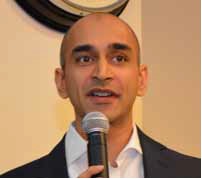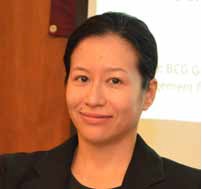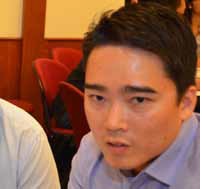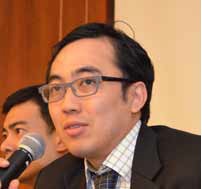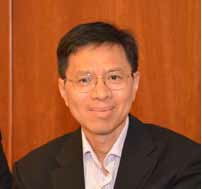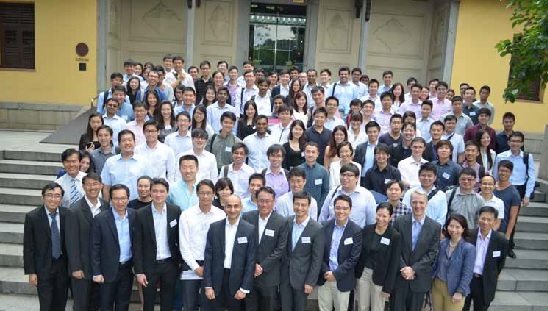 CFA Singapore’s Asset Management & Career Development Committees hosted the first “Building Careers in Asset Management” Seminar on 29 March 2014 on the University of Chicago Booth School of Business campus in Singapore.
CFA Singapore’s Asset Management & Career Development Committees hosted the first “Building Careers in Asset Management” Seminar on 29 March 2014 on the University of Chicago Booth School of Business campus in Singapore.
Photos by Sim Kih
|
TODAY’S TRENDS IN THE ASSET MANAGEMENT INDUSTRY |
 Paul Bernard, CFA
Paul Bernard, CFA
Managing Director
TTS Advisors
Mr Paul Bernard, CFA, who retired as a Goldman Sachs Managing Director in 2011 after being in its Investment Research division for 19 years, had the following pointers for those starting out in their career.
1. Do Someting Simulating
Whatever the job, it should be something you find stimulation in. If not, you should look for another job. You spend an exceptionally high proportion of your life at work, and there are trade offs. “I noticed a lot of people ended up in jobs because they thought were prestigious or something they could talk to their families about. You don’t want to come to a realization that you don’t like what you are doing when you are in your mid thirties or forties.”
2. Do Your Job Exceptionally Well
That’s the only way you can move up in an organization.
3. Understand Your Job Description
Understand what your job description is, not only your job title. What does your boss actually want you to do? It’s an important dialogue to have with your boss. How is your success defined? “At times when I was running a research department, the most important thing was managing costs. At other times, it was about building an onshore China research presence more quickly than anyone else could.” The environment will dictate what success is.
4. Make Yourself Necessary
If an organization finds you a necessity, it will go out of its way to take care of you.
5. Seek Feedback
Seek feedback from your bosses and peers on how you’re doing in what you’re doing. This feedback is often not forthcoming during the early part of your career, so you have to aggressively go out there to find that out.
6. Act the Part
Think about how you dress and the things you say.
Here are the insights from the other industry veterans.
|
KNOW WHAT YOU ARE GOOD AT
LI YING: It is very difficult to graduate out of school and have made plans knowing what the rest of your life will look like and what your career will look like. You should have some aspirations and you should have dreams, but they are going to change along the way because you are going to learn things and you are not going to be exactly the same person. |
TENACITY IS IMPORTANT
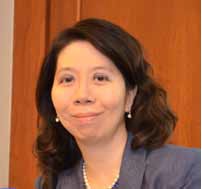 Madeline Ho
Madeline Ho
Head of Wholesale Distribution for Asia Pacific and Managing Director of Singapore office
Natixis Global Asset ManagementMADELINE: We may not always know what we want to do when we start out and I’ve seen people change roles when they don’t achieve success to their expectations after two years.
There are many sub-roles in asset management and I see people going to the client side, and then returning to the asset management side. You need to exceed your current role before you think about something else.
LEARN SOMETHING EVERY DAY
The Chinese say that if you don’t move forward, you are automatically moving backward. That is, your peers will move ahead of you. If you are not in a job that makes you feel that you can learn every day, you will find yourself feeling complacent. You will then find yourself overtaken by those who are hungrier, more aggressive, and who move much faster than you.
WORK WITH A MENTOR
The mentor is not only there to guide you. He is also there to inspire. When I was a trainee bank officer, I was working under the head of consumer banking, which is a very important position in the banking sector. He gave e many funny jobs, even taking minutes at the meeting for another department. Listening to other people helped me learn a lot.
|
JOSHUA: Recruiters receive thousands of resumes and have no time to scrutinize each one. Some investment banks I’ve worked with had computer software to pick out keywords in resumes to shortlist candidates for interviews. |
BE OPEN IN THE INTERVIEW
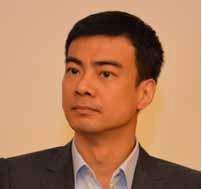 Sean Quek, CFA
Sean Quek, CFA
Head of Equity Research
Bank of SingaporeSEAN: When you go for an interview, you want to pass the test and get selected. But we want to hire the person who is a right fit, rather than the best performer for the test.
From the interview session, you should try to find out if the job is what you want to do. If you get the job only to find out that is not want you want, it becomes a lose-lose situation for you and your employer because you will be less engaged and less motivated. Ideally, you should be open when presenting yourself to the recruiting manager, so that he has an idea whether you are someone the company is looking for. Otherwise, they may find you unsuitable only after you start working.
INTERNSHIP IS VERY IMPORTANT
SEAN: Internship is very important. You get to see your seniors actually in the role. On the other hand, you also find out if that role is what you want. Finding the right fit is key. For us, if we find the right person, 50% of the job is done. A 3-month interview is much better than one single 30 minute interview.
PATRICK: If you prove yourself during the internship, your chances of getting the job is more than 50%. If you have some connections, it will help. We are quite favorable toward taking the children of clients as interns, subject to them having the necessary academic qualifications.
|
BE ADAPTABLE
|
BE PASSIONATE
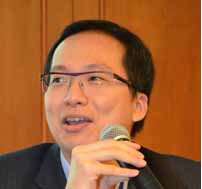 Freddy Lim
Freddy Lim
Managing Director and Global Head of Derivatives Strategy NomuraFREDDY: You can’t separate work from your daily life. I have seen a lot of people say to colleagues, “Don’t call me. I don’t want to know any of you after six. It’s my personal time.” That’s the wrong attitude. Unfortunately, work is part of your life, and you have to deal with it. The way to deal with it is to be passionate about it.
So, the foremost thing is to understand what you like and what you don’t like. What is your strength and what is your weakness? Tradition may tell you to work on your weaknesses, but today’s market is less forgiving and more time-sensitive. Look within yourself and ask, ‘Am I a people person? Am I a numbers person? Can I do both?’
You may have a passion right now and change your mind about that later. That’s great. But always, go in the direction of your passion. It is that passion that drives you to acquire the skills you need. And those skills are not pre-defined. The skill set that the asset management industry needs is ever changing.
In asset management, you have to know your niche. When you bet, you want to bet smart. Think about your edge. If you don’t have an edge, think about how you are going to get it.
|
WHAT DO YOU THINK OF MID-CAREER SWITCHES? EXPERIENCE COUNTS |
GET ONTO THE CFA PROGRAM
In wealth management, you need knowledge of all asset classes and expertise in one of them. So, going through the CFA program is good.
SEAN: What you want to show the prospective employer is you have at least the technical skills to perform the role you are applying for. So being on the CFA program will add to your resume.
STAND OUT FROM THE CROWD
 Ryan Yeo
Ryan Yeo
Co-head of Investments
Investment Company of the PRC (a sovereign wealth fund under China’s State Administration of Foreign Exchange)RYAN: I work for the Chinese. Social expectations of the PRC Chinese are distinctively different from the typical Singaporean, or someone from America or Europe. As a portfolio manager, not only do you need to be disciplined in your investments, you also need to keep your clients happy by being aware of their cultural norms.
We also need to generate a good profit and loss account. We want to hire someone who can give different opinions, not someone who says yes to everything.
I see 600 resumes but only hire 4 people, so make sure your resume stands out.
Get the CFA Charter. You have only 30 to 40 minutes with the interviewer, so make sure you sell yourself well during the meeting.
THERE’S CHANCE EVEN IF YOU ARE NOT THE BEST
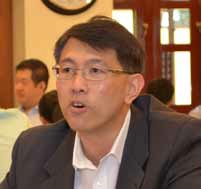 Patrick Yeo, CFA
Patrick Yeo, CFA
Head of Fixed Income
Fullerton Fund Management (a spin-off of Temasek Holdings)PATRICK: We often want to hire the best and brightest, but these may not be the best fit for the company.
The challenge is for us to choose someone who is good in what he does, is able to fit into the team and grow to his full potential.
We don’t spend much time in the recruitment process for junior or mid-level personnel, but we can spend 3 to 6 months searching for the right candidate for the team. Sometimes, we take up to a year.
The last time I hired, I looked at 20 to 30 resumes after head-hunters sieved out the relevant candidates. Eventually, I didn’t hire anyone from the resumes I had.
Instead, I hired someone whom I worked with when she did due diligence on our fund for Credit Suisse. I found her to be with common sense and diligent.
Wherever you are, you have to be professional and knowledgeable in your job. You have to come across as good. That’s the best way for you to impress. I usually put aside resumes of people who change jobs just for the sake of changing - those who seek for another job in less than two years.


